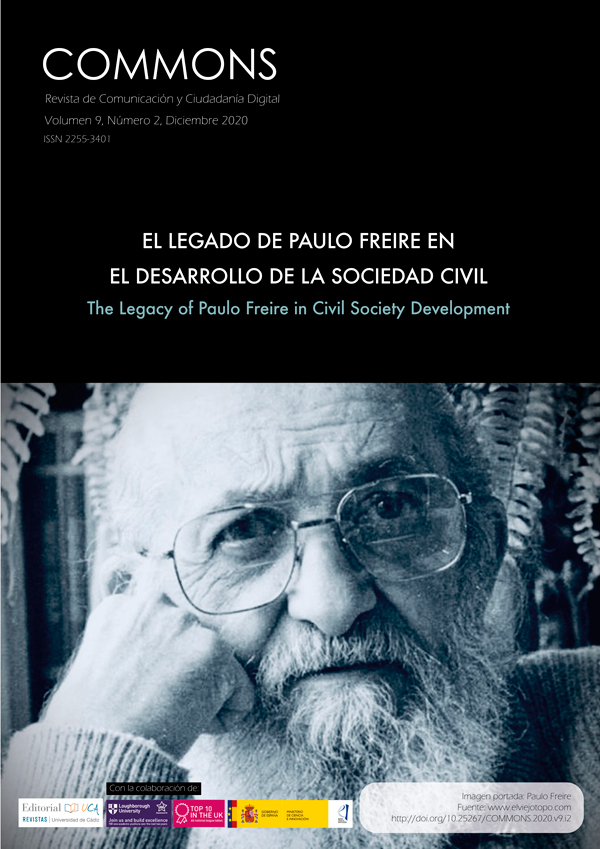Connections with Paulo Freire’s legacy in anti-racism media activist collaboration in Finland / Conexiones con el legado de Paulo Freire en la colaboración mediactivista antirracismo en Finlandia

DOI
https://doi.org/10.25267/COMMONS.2020.v9.i2.04Información
Resumen
En este artículo, presentamos la iniciativa Anti-Racism Media Activist Alliance (ARMA Alliance, 2018-2020), con sede en Finlandia. El artículo presenta nuestras reflexiones ético-metodológicas sobre los procesos de colaboración y diálogo que hemos experimentado como cofundadores y coordinadores de ARMA Alliance. Nuestro análisis se basa en nuestros trabajos retrospectivos conjuntos sobre el modo en el que los propósitos de investigación activista de ARMA Alliance se conectan con el legado de Paulo Freire. Nuestro objetivo es contribuir a los debates académicos que problematizan las múltiples relaciones entre la investigación y el activismo en procesos colaborativos de comunicación para el cambio social (en nuestro caso, contra el racismo). Primero, presentamos lo que significa la iniciativa ARMA Alliance y cómo se conecta con el trabajo de Paulo Freire. Luego, miramos hacia atrás a las ideas descoloniales, los encuentros catárticos y los diálogos que llevaron al desarrollo de la iniciativa. Después de eso, reflexionamos sobre la relación entre colaboración y concientización. Por último, indicamos algunas experiencias para poner en práctica el diálogo y la colaboración.
Palabras clave
Descargas
Cómo citar
Licencia
Aquellos autores/as que tengan publicaciones con esta revista, aceptan los términos siguientes:
- Los autores/as conservarán sus derechos de autor y garantizarán a la revista el derecho de primera publicación de su obra, el cual estará simultáneamente sujeto a la Licencia de reconocimiento de Creative Commons 3.0, que permite a terceros compartir la obra siempre que se indique su autor y su primera publicación esta revista.
- Los autores/as podrán adoptar otros acuerdos de licencia no exclusiva de distribución de la versión de la obra publicada (p. ej.: depositarla en un archivo telemático institucional o publicarla en un volumen monográfico) siempre que se indique la publicación inicial en esta revista.
- Se permite y recomienda a los autores/as difundir su obra a través de Internet (p. ej.: en archivos telemáticos institucionales o en su página web) antes y durante el proceso de envío, lo cual puede producir intercambios interesantes y aumentar las citas de la obra publicada. (Véase El efecto del acceso abierto).
Citas
BHAMBRA, G. K. (2014). Connected sociologies. London: Bloomsbury.
CUSICANQUI, S. R. (2012). Ch’ixinakax utxiwa: A Reflection on the Practices and Discourses of Decolonization. South Atlantic Quarterly, 111(1), 95–109. doi: 10.1215/00382876-1472612
CUSTÓDIO, L. (2016). Global overview of community media as peripheral political action (in Portuguese). Revista Mídia e Cotidiano, 10(10), 138-157. doi: https://doi.org/10.22409/ppgmc.v10i10.9799
CUSTÓDIO, L. (2017). Favela media activism: Counterpublics for human rights in Brazil. Lanham: Lexington Books.
DERICKSON, K. & ROUTLEDGE, P. (2015). Resourcing Scholar-Activism: Collaboration, Transformation, and the Production of Knowledge. The Professional Geographer, 67(1), 1–7. doi: 10.1080/00330124.2014.883958
FREIRE, P. (1998). Reprint: Cultural Action for Freedom. Harvard Educational Review, 68(4), 471–521. doi: https://doi.org/10.17763/ haer.68.4.656ku47213445042
FREIRE, P. (2000). Pedagogy of the oppressed (30th anniversary edition). New York: Continuum.
FREIRE, P. (2013a). Pedagogia da esperança: Um reencontro com a pedagogia do oprimido. Rio de Janeiro: Paz e Terra.
FREIRE, P. (2013b). Extensão ou comunicação?. São Paulo: Paz e Terra.
FREIRE, P. & MACEDO, D. (1995). A Dialogue: Culture, Language, and Race. Harvard Educational Review, 65(3), 377–402. doi: https://doi.org/10.17763/ haer.65.3.12g1923330p1xhj8
GANESH, S. & ZOLLER, H. (2012). Dialogue, Activism, and Democratic Social Change. Communication Theory, 22(1), 66–91. doi: 10.1111/j.1468- 2885.2011.01396.x
GATHUO, M. (2019). The inside outsider: The effects and self-reflections of researching one’s own community. In A. KYNSILEHTO, S. PELLANDER & E. PUUMALA (Orgs. Committee). 16th ETMU Conference 2019: Solidarity, participation, and politics. Solidarities in Politically Engaged Research: Ethical and Methodological Challenges and Innovative Practices. Tampere University, Finland.
GUMUCIO DAGRON, A. & TUFTE, T. (Eds). (2006). Communication for Social Change Anthology: Historical and Contemporary Readings. South Orange (N.J.): Communication for Social Change Consortium.
HALE, C. (Ed.). (2008). Engaging contradictions: Theory, politics, and methods of activist scholarship. Berkeley: University of California Press.
KENDI, I. X. (2016). Stamped from the beginning: The definitive history of racist ideas in America. New York: Nation Books.
KENDI, I. X. (2019). How to be an anti-racist. London: Penguin Random House.
KESKINEN, S. P. (2018). The ‘Crisis’ of White Hegemony, Neonationalist Femininities and Antiracist Feminism. Women’s Studies International Forum, 68(May-June), 157-163. doi: https://doi.org/10.1016/j.wsif.2017.11.001
KLANDERMANS, B. & STAGGENBORG, S. (2002). Methods of social movement research. Minneapolis: University of Minnesota Press.
LOFTSDÓTTIR, K. & JENSEN, L. (Eds). (2016). Whiteness and postcolonialism in the Nordic Region: Exceptionalism, migrant others and national identities. Farnham: Ashgate.
MALDONADO-TORRES, N. (2007). On the coloniality of being. Cultural Studies, 21(2-3), 240-270. doi: 10.1080/09502380601162548
MAYO, P. (2008). Liberating praxis: Paulo Freire’s legacy for radical education and politics. Rotterdam: Sense.
MIGNOLO, W. (2011). The darker side of Western modernity: Global futures, decolonial options. Durham: Duke University Press. MIGNOLO, W. & ESCOBAR, A. (2010). Globalization and the decolonial option. London: Routledge.
PICKARD, V. W. & YANG, G. (2017). Media activism in the digital age. London; New York: Routledge.
QUIJANO, A. (2007). Coloniality and modernity/rationality. Cultural Studies, 21(2-3), 168-178. doi: 10.1080/09502380601164353.
SAINI, A. (2019). Superior: The return of race science. London: Harper Collins Publishers.
TITLEY, G. (2019). Racism and the media. London: SAGE Publications.
TUCK, E. & YANG, K. W. (2012). Decolonization is not a metaphor. Decolonization: Indigeneity, Education & Society, 1(1), 01-40.
WANG, D. & SOULE, S. (2012). Social Movement Organizational Collaboration: Networks of Learning and the Diffusion of Protest Tactics, 1960–1995. American Journal of Sociology, 117(6), 1674–1722. doi: 10.1086/664685
YANCY, G. (2017). On race: 34 conversations in a time of crisis. New York: Oxford University Press.






